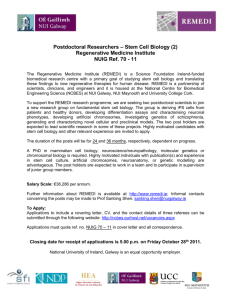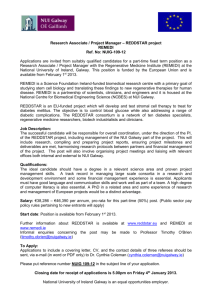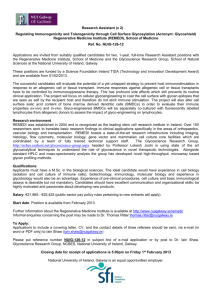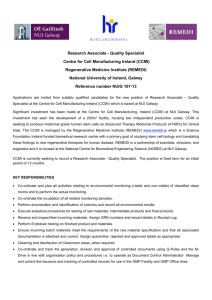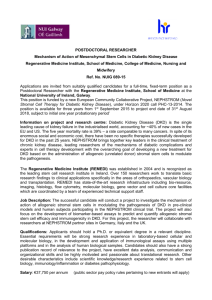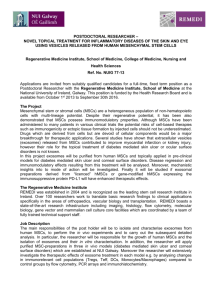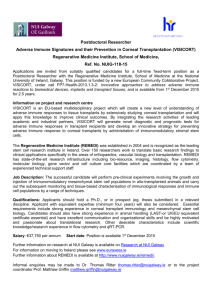W WELCOME NOTE FROM THE DIRECTOR
advertisement
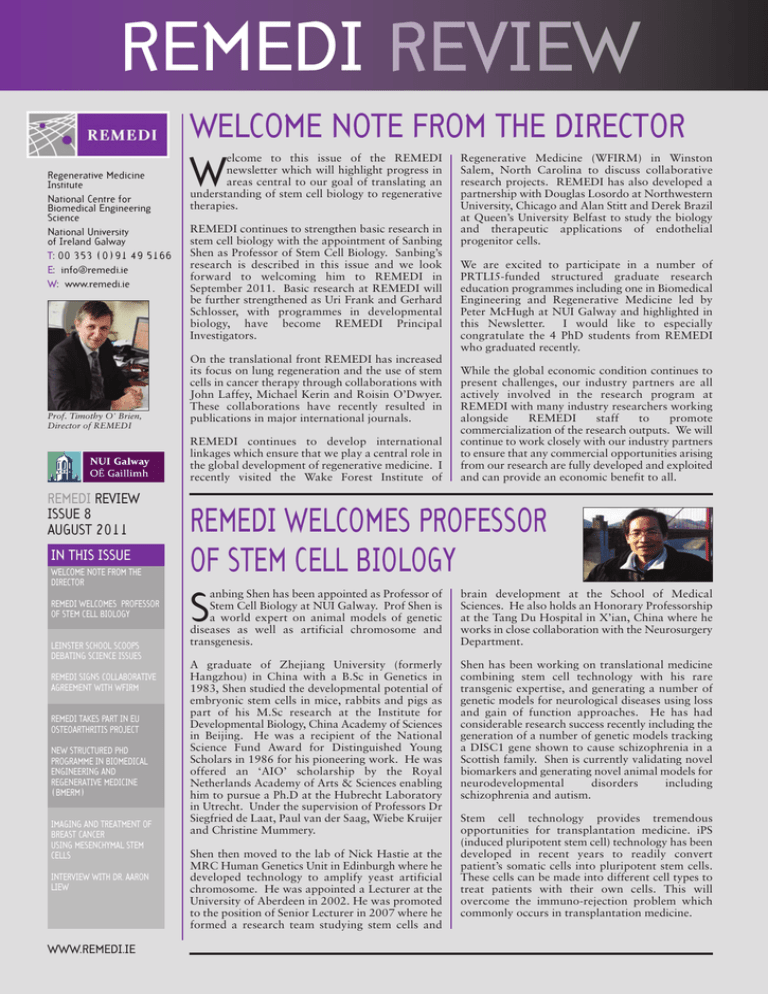
REMEDI WELCOME NOTE FROM THE DIRECTOR Regenerative Medicine Institute National Centre for Biomedical Engineering Science National University of Ireland Galway T: 00 353 (0)91 49 5166 E: info@remedi.ie W: www.remedi.ie Prof. Timothy O' Brien, Director of REMEDI elcome to this issue of the REMEDI newsletter which will highlight progress in areas central to our goal of translating an understanding of stem cell biology to regenerative therapies. W REMEDI continues to strengthen basic research in stem cell biology with the appointment of Sanbing Shen as Professor of Stem Cell Biology. Sanbing’s research is described in this issue and we look forward to welcoming him to REMEDI in September 2011. Basic research at REMEDI will be further strengthened as Uri Frank and Gerhard Schlosser, with programmes in developmental biology, have become REMEDI Principal Investigators. On the translational front REMEDI has increased its focus on lung regeneration and the use of stem cells in cancer therapy through collaborations with John Laffey, Michael Kerin and Roisin O’Dwyer. These collaborations have recently resulted in publications in major international journals. REMEDI continues to develop international linkages which ensure that we play a central role in the global development of regenerative medicine. I recently visited the Wake Forest Institute of REMEDI REVIEW ISSUE 8 AUGUST 2011 IN THIS ISSUE WELCOME NOTE FROM THE DIRECTOR REMEDI WELCOMES PROFESSOR OF STEM CELL BIOLOGY LEINSTER SCHOOL SCOOPS DEBATING SCIENCE ISSUES REMEDI SIGNS COLLABORATIVE AGREEMENT WITH WFIRM REMEDI TAKES PART IN EU OSTEOARTHRITIS PROJECT NEW STRUCTURED PHD PROGRAMME IN BIOMEDICAL ENGINEERING AND REGENERATIVE MEDICINE (BMERM) IMAGING AND TREATMENT OF BREAST CANCER USING MESENCHYMAL STEM CELLS INTERVIEW WITH DR. AARON LIEW WWW.REMEDI.IE Regenerative Medicine (WFIRM) in Winston Salem, North Carolina to discuss collaborative research projects. REMEDI has also developed a partnership with Douglas Losordo at Northwestern University, Chicago and Alan Stitt and Derek Brazil at Queen’s University Belfast to study the biology and therapeutic applications of endothelial progenitor cells. We are excited to participate in a number of PRTLI5-funded structured graduate research education programmes including one in Biomedical Engineering and Regenerative Medicine led by Peter McHugh at NUI Galway and highlighted in this Newsletter. I would like to especially congratulate the 4 PhD students from REMEDI who graduated recently. While the global economic condition continues to present challenges, our industry partners are all actively involved in the research program at REMEDI with many industry researchers working alongside REMEDI staff to promote commercialization of the research outputs. We will continue to work closely with our industry partners to ensure that any commercial opportunities arising from our research are fully developed and exploited and can provide an economic benefit to all. REMEDI WELCOMES PROFESSOR OF STEM CELL BIOLOGY anbing Shen has been appointed as Professor of Stem Cell Biology at NUI Galway. Prof Shen is a world expert on animal models of genetic diseases as well as artificial chromosome and transgenesis. S brain development at the School of Medical Sciences. He also holds an Honorary Professorship at the Tang Du Hospital in X’ian, China where he works in close collaboration with the Neurosurgery Department. A graduate of Zhejiang University (formerly Hangzhou) in China with a B.Sc in Genetics in 1983, Shen studied the developmental potential of embryonic stem cells in mice, rabbits and pigs as part of his M.Sc research at the Institute for Developmental Biology, China Academy of Sciences in Beijing. He was a recipient of the National Science Fund Award for Distinguished Young Scholars in 1986 for his pioneering work. He was offered an ‘AIO’ scholarship by the Royal Netherlands Academy of Arts & Sciences enabling him to pursue a Ph.D at the Hubrecht Laboratory in Utrecht. Under the supervision of Professors Dr Siegfried de Laat, Paul van der Saag, Wiebe Kruijer and Christine Mummery. Shen has been working on translational medicine combining stem cell technology with his rare transgenic expertise, and generating a number of genetic models for neurological diseases using loss and gain of function approaches. He has had considerable research success recently including the generation of a number of genetic models tracking a DISC1 gene shown to cause schizophrenia in a Scottish family. Shen is currently validating novel biomarkers and generating novel animal models for neurodevelopmental disorders including schizophrenia and autism. Shen then moved to the lab of Nick Hastie at the MRC Human Genetics Unit in Edinburgh where he developed technology to amplify yeast artificial chromosome. He was appointed a Lecturer at the University of Aberdeen in 2002. He was promoted to the position of Senior Lecturer in 2007 where he formed a research team studying stem cells and Stem cell technology provides tremendous opportunities for transplantation medicine. iPS (induced pluripotent stem cell) technology has been developed in recent years to readily convert patient’s somatic cells into pluripotent stem cells. These cells can be made into different cell types to treat patients with their own cells. This will overcome the immuno-rejection problem which commonly occurs in transplantation medicine. 2 REMEDI REVIEW REMEDI WELCOMES PROFESSOR OF STEM CELL BIOLOGY At REMEDI, Shen will lead a team to derive iPS cells from patients, and to develop cell models for investigating mechanisms of the diseases and for drug screening towards the development of novel pharmacological treatments. He also plans to develop an artificial chromosome technology to correct the genetic defectiveness in patients’ iPS cells before cell transplantation. part of our effort will be to ensure that our translational targets are linked to research in basic science. Sanbing’s appointment will link our basic and translational research programmes at REMEDI.” Professor Tim O’Brien, Director of REMEDI, states that Sanbing’s appointment to the Chair of Stem Cell Biology at NUI Galway will strengthen research in fundamental stem cell biology and so underpin translational efforts in regenerative medicine. “A fundamental understanding of basic stem cell biology will be essential to the future translation of regenerative medicine therapies to the clinic. A major LEINSTER SCHOOL SCOOPS DEBATING SCIENCE ISSUES t. Vincent’s Secondary School, Dundalk, Co. Louth were declared the All-Ireland winners of Debating Science Issues (DSI) 2011. The grand final which took place at the Science Gallery at Trinity College Dublin on April 14 was the result of a field of 56 schools narrowing to just four. The team from Dundalk successfully persuaded Professor Tom Sherry, Dean of Science at National University of Ireland Galway, Dr. Amy Sanders, Wellcome Trust Special Projects Manager, and Professor Orla Sheils Lecturer in Pathology and Medical Jurisprudence at Trinity College, that “animal testing is necessary for the advancement of disease treatment”. Coláiste an Phiarsaigh of Glanmire, Co. Cork were the Runners up at the Final. Ulster was represented by St. Catherine’s Vocational School, Killybegs, Co. Donegal and Connacht by St. Joseph’s College Garbally, Co. Galway. S biomedical, bioethical workshop to facilitate discussion on the ethical issues raised by stem cell research, genetically modified food, nanotechnology, health and self-testing kits or flu vaccinations. School students research further in preparation for the debate motion related to the initial workshop. From there, the debate motions circulate so that students debate on an array of controversial topical issues. Boston Scientific and NUI Galway’s College of Science sponsored the provincial trophies and prizes. Debating Science Issues is a cross border schools science debating competition supported by a Wellcome Trust People Award for four consecutive years and involves eight collaborating partners: the Regenerative Medicine Institute (REMEDI) at NUI Galway, W5 in Belfast, Biomedical Diagnostics Institute (BDI) at DCU, Royal College of Surgeons Ireland, CRANN at TCD, CLARITY at UCD, Tyndall National Institute and Alimentary Pharmabiotic Centre both at UCC. Co-ordinated by REMEDI’s Outreach Officer Danielle Nicholson, the competition encourages young people to engage in debate on the cultural, societal and ethical implications of advances in biomedical science. Schools taking part initially receive a 3 hour REMEDI SIGNS COLLABORATIVE AGREEMENT WITH WFIRM T he Regenerative Medicine Institute (REMEDI) along with the Network of Excellence for Functional Biomaterials (NFB) also based at NUI Galway formally signed a Memorandum of Understanding with Wake Forest Institute for Regenerative Medicine (WFIRM) recently. WFIRM is one of the leading institutes in tissue engineering and regenerative medicine in the USA. Professor Timothy O’Brien, Director of REMEDI at NUI Galway, said: “I look forward to the potential that this agreement offers to both REMEDI and WFIRM to accelerate the translation of regenerative medicine from basic research to the clinic”. Speaking at the signing, Professor Abhay Pandit, Director of the NFB, NUI Galway, said: “This agreement facilitates the establishment of student and faculty exchanges, research collaborations and the codevelopment of any specific tissue engineering and regenerative medicine-related projects which may have academic, clinical and commercial implications”. WWW.REMEDI.IE The Wake Forest Institute for Regenerative Medicine is part of Wake Forest University Baptist Medical Center in Winston-Salem, North Carolina. The centre has built up a significant reputation in the development of tissue engineering and regenerative medicine and is renowned for development from concept to translation in the clinic. 3 REMEDI REVIEW REMEDI TAKES PART IN EU OSTEOARTHRITIS PROJECT rthritis is affecting increasing numbers of people in Ireland, with an estimated three-quarters of a million men and up to 1 in 6 women affected. The vast majority of people with arthritis suffer from osteoarthritis, the most common form of degenerative arthritis. REMEDI researchers began an FP7 EU-funded project called GAMBA (Gene Activated Matrices for Bone and Cartilage Regeneration in Arthritis) in late 2010, which ultimately aims to use regenerative medicine therapies to find new methods of treatment for arthritis through the use of stem cells, gene therapy and materials to stimulate self-healing. A REMEDI’s orthobiologics group led by Dr. Mary Murphy is working in collaboration with a number of partners from Germany, France, Italy, the Netherlands and Switzerland. GAMBA is coordinated by the University Hospital Rechts de Iser at the Munich Technical University, Germany. REMEDI will receive €400,000 in funding over the three years of the project. REMEDI researchers, Dr. Eric Farrell and Niamh Fahy along with the gene therapy research group led by Dr. Thomas Ritter aim to develop methods for immune-modulation in the osteoarthritic joint to prevent progression of osteoarthritis and pain. Pro-inflammatory factors normally produced in the diseased joint will be harnessed as triggers for initiation of an anti-inflammatory response. This will be achieved by the use of gene therapy with the production of an antiinflammatory molecule called interleukin-10 which is controlled by a switch that is turned on as the joint becomes inflamed. Other strategies for temporal repair in osteoarthritis will focus on damaged cartilage and bone. REMEDI, along with the other partners in the project, also aims to develop greater awareness and debate on the societal and ethical issues that affect patients and the public alike. GAMBA will develop and use outreach methods called patient and citizen panels in order to increase awareness of the role that regenerative is playing in finding new therapies to treat osteoarthritis. Already an outreach project between patients and researchers has been rolled out in GAMBA’s dissemination point in Munich. Galway will host a future event to help improve general awareness of nano-medicine among the general public here. Dr. Mary Murphy, who is leading the GAMBA project at REMEDI, says that “GAMBA aims to bring the power of nanomedicine to the treatment of osteoarthritis by focusing on development of techniques to promote self-healing of the cells affected by the disease. Advances in this area will ultimately lead to novel therapies and, most importantly, an improved quality of life for people with arthritis.” NEW STRUCTURED PHD PROGRAMME IN BIOMEDICAL ENGINEERING AND REGENERATIVE MEDICINE (BMERM) he medical technology industry is critically important internationally and is one of the pillars of the Irish economy, with a tremendous potential for growth. It is dependent on having a highly educated and trained workforce and a strong research and innovation capability. Biomedical engineering and regenerative medicine are at the heart of this growth potential and this structured PhD programme is designed to produce graduates who will be the next generation of leaders in the industry and in academic research and education in the field. T This four year structured PhD Programme in Biomedical Engineering and Regenerative Medicine will be delivered by a core partnership of institutions: National University of Ireland Galway (Coordinator), University of Limerick and University College Cork and will be linked with a wider consortium of partner institutions nationally and internationally, including: Galway-Mayo Institute of Technology, Institute of Technology Sligo, University of Ulster, Queen’s University Belfast, Georgia Institute of Technology, USA, University of Pittsburgh, USA, Duke University, USA, Rice University, USA, Mayo Clinic, USA, RWTH Aachen University, Germany, Georgia Tech Ireland, and the Irish Medical Devices Association (IMDA). WWW.REMEDI.IE BMERM combines a PhD research project with a unique didactic and experiential learning programme, resulting in an unparalleled learning experience for the student in terms of its combination of world-class research and focused clinical and industrial engagement, the latter facilitated by the direct involvement of IMDA with is membership of over 100 medical technology companies in Ireland. At the core of the programme is the PhD research project, performed in collaboration with internationally renowned investigators, in one of the following five areas: Functional Biomaterials; Mechanics of Biological Cells, Tissues and Systems; Bioelectronics and Rehabilitation Engineering; Regenerative Orthobiologics and Neurotherapeutics; Regenerative Cardiovascular Therapeutics. The BMERM didactic and experiential learning programme involves the following elements: Student Placement, Annual Summer School, Medical Sciences and Clinical Attachment module, unique “BioInnovate” modules for medical technology innovation, design and entrepreneurship training, Generic Skills modules, and a range of advanced discipline-specific modules aligned with the five research areas. Professor Noel Caplice, REMEDI and Professor of Cardiovascular Science/Consultant Cardiologist, CUH/UCC said, “This is an exciting interaction between universities that are already co-operating on stem cell and cardiovascular thematic research. We believe this BMERM interaction will only strengthen this collaboration. 6 REMEDI REVIEW IMAGING AND TREATMENT OF BREAST CANCER USING MESENCHYMAL STEM CELLS esenchymal stem cells (MSCs) are adult stem cells that appear to have the ability to “find” tumours. Tumours release signals that stimulate MSCs to migrate towards them and become incorporated into the tumour. Researchers at REMEDI along with some leading international partners have recently published research reporting the ability to track MSCs in real time as they migrate to the tumour site, followed by therapy to reduce tumour growth. M the MSCs were engrafted in their intended destination, a therapeutic dose of radioactive iodide was administered. The ability to image the MSCs to confirm engraftment in tumour tissue allowed researchers to deliver therapy mediated by the MSCs at the optimal timepoint, sparing surrounding healthy tissues. This resulted in a significant reduction in tumour growth, with no negative side effects observed. As a result of this efficient “homing” to the tumour site, many studies have been performed attempting to use MSCs for delivery of therapeutic agents directly to tumour tissue, while sparing healthy surrounding tissue. One of the major challenges to this approach is the possibility of the MSCs residing in other organs in the body rather than their intended destination of the tumour tissue. The results of the work were recently published in the highly rated international journal “Stem Cells” by Dr. Róisín Dwyer and Prof. Michael Kerin, in collaboration with research groups at REMEDI led by Prof. Frank Barry, Dr. Mary Murphy and Prof. Timothy O’Brien. Colleagues from the Schools of Medicine and Physics in NUI Galway also contributed significantly. In work carried out at NUI Galway, MSCs were engineered to take up a radioactive tracer, which could then be tracked as the cells travelled towards the breast tumour. Imaging was performed using a BazookaSPECT imaging system designed by researchers at the Center for Gamma Ray Imaging at the University of Arizona in Tucson. The imaging system tracks the MSCs in real time to determine the time point at which they reached the tumour site. Once The results of the breast cancer study are extremely promising, as MSCs can target many different tumour types so this approach has potential applications in a range of other cancers. This work received financial support from Science Foundation Ireland, the Health Research Board, Cancer Research Ireland, and also the University of Arizona Center for Gamma Ray Imaging which is funded in part by the US National Institute of Health (NIH). INTERVIEW WITH DR. AARON LIEW r. Aaron Liew is a postdoctoral researcher at REMEDI. In a recent interview he described the focus of his research at REMEDI as well as his interest in regenerative medicine. D Aaron came from Malaysia in 1995. He completed his undergraduate medical degree in the Royal College of Surgeons in Ireland (RCSI) in 2000. He completed the Higher Specialist Training (HST) in two specialties; Diabetes & Endocrinology and General Internal Medicine in June 2010 before joining REMEDI as a postdoctoral research fellow. In between his HST, he spent three years full time in REMEDI, prior to obtaining his PhD degree in 2008. His PhD theses focused on the effect of diabetes related dysfunction of endothelial progenitor and mature endothelial cells. Aaron is currently involved in the Cell Therapy and Angiogenesis for Peripheral Vascular Disease work programme under the supervision of Professor Timothy O’Brien. This project is jointly funded by Science Foundation Ireland (SFI) and industry partner Medtronic Vascular. His current research focuses on the efficacy of mesenchymal stem cells (MSCs) and Ephrin B2-expressing MSC therapy in a model of hindlimb ischemia. He is also interested in the role of endothelial progenitor cells (EPCs) especially in the diabetic setting, and nonviral gene therapy approaches such as electroporation for improving MSC function. “Currently, there is a paradigm shift of research focus into translational research involving multidisciplinary collaboration whereby findings in basic science research are translated into medical practice with meaningful health outcomes. Regenerative medicine which falls under this remit holds the promise of regenerating damaged tissues and organs in the body by stimulating previously irreparable tissues to repair themselves. I am interested in the potential therapeutic role of stem cell, in particular, the MSC in critical limb ischaemia (CLI). CLI, which is a condition characterised by the presence of rest pain or impending tissue loss secondary to an objectively proven arterial occlusive disease, is predominantly caused by atherosclerosis. The increase in the prevalence of diabetes and an aging population resulted in the increase in this condition. To date, the only option available for patients with CLI who are not amenable for either surgical or endovascular revascularisation, is amputation. Therefore, novel treatments such as MSC-based therapy are urgently needed”, Aaron says. “There are multiple data from pre-clinical studies and early human trials which demonstrate that MSC-based therapy in patients with CLI are safe with some suggestion of clinical efficacy. Further larger phase 3 clinical trials are required to determine the efficacy of MSC-based therapy in patients with CLI. The close proximity of the National GMP Facility in REMEDI, the Clinical Research Facility Galway (CRFG) and the Galway University Hospital (GUH) renders Galway the most ideal site in Ireland to conduct a successful stem cell-based clinical trial. Furthermore, there are also vast opportunities to collaborate with many researchers within the university”, he added. Aaron in collaboration with Professor Lluis Mir and Dr. Franck Andre from Vectorology and Anti-cancerous Therapeutics, Institute Gustave-Roussy, Villejuif, France, has successfully secured a Ulysses Grant from the Irish Research Council for Science, Engineering and Technology (IRCSET) in partnership with Teagasc, the French Embassy, the French Foreign Ministry, and Égide. The Ulysses programme facilitates the exchange of innovative ideas and approaches between Irish and French researchers and the development of mutual research projects by supporting young Irish researchers visiting France and reciprocal visits by young French researchers to Ireland of which the main purpose is to establish future research networks. Aaron’s research project will determine the optimal method for electrotransfection of human MSCs for clinical use. Cliniporator, which is a state-of-the-art electroporator and is currently utilised in the clinical settings in France will be used in this project. “This Ulysses grant not only allows us to determine the best approach to genetically modify the MSC to enhance its therapeutic effect, but, it also facilitates future research collaboration with Professor Mir and Dr. Andre’s team in France”, Aaron concluded.
